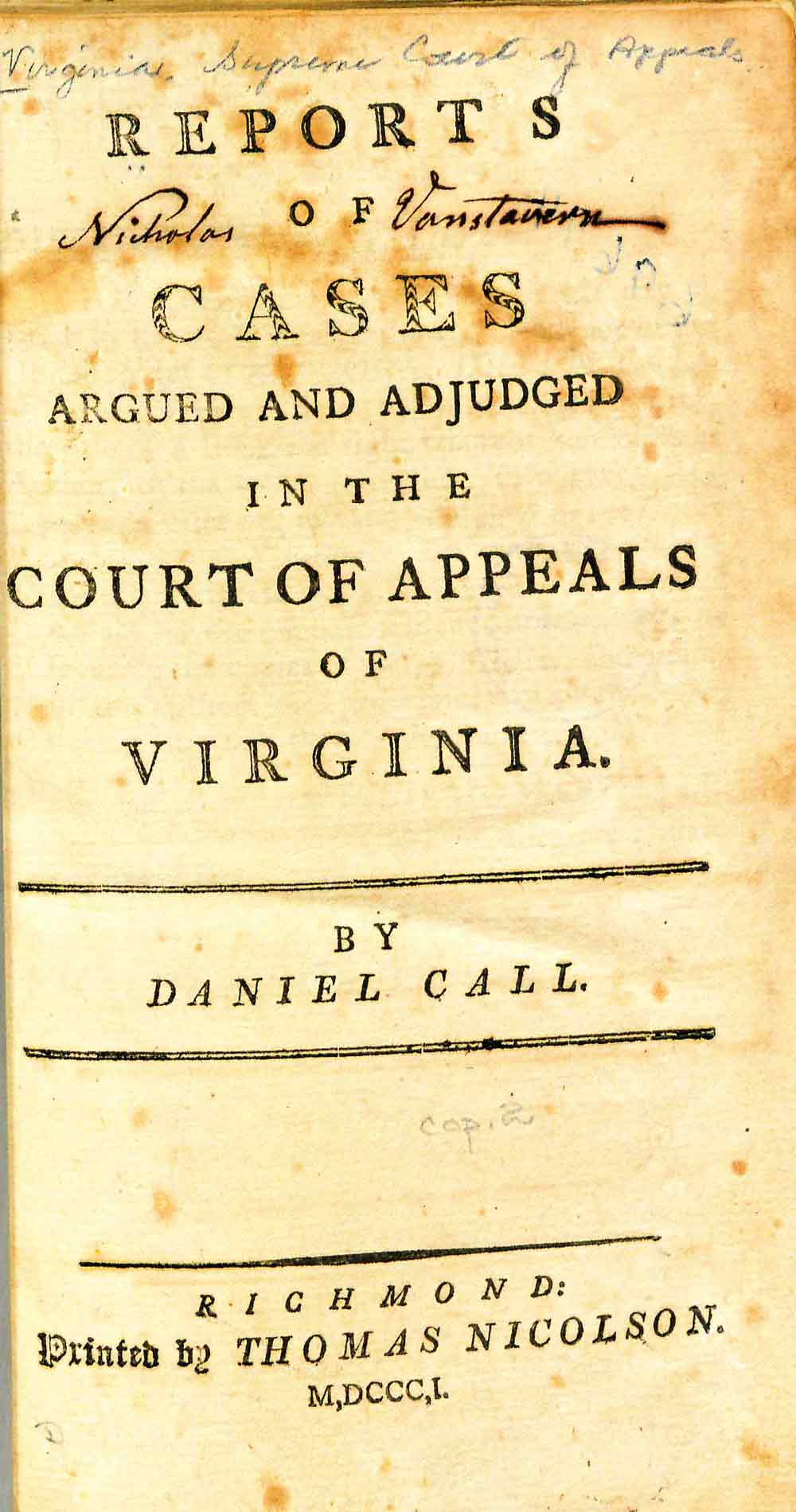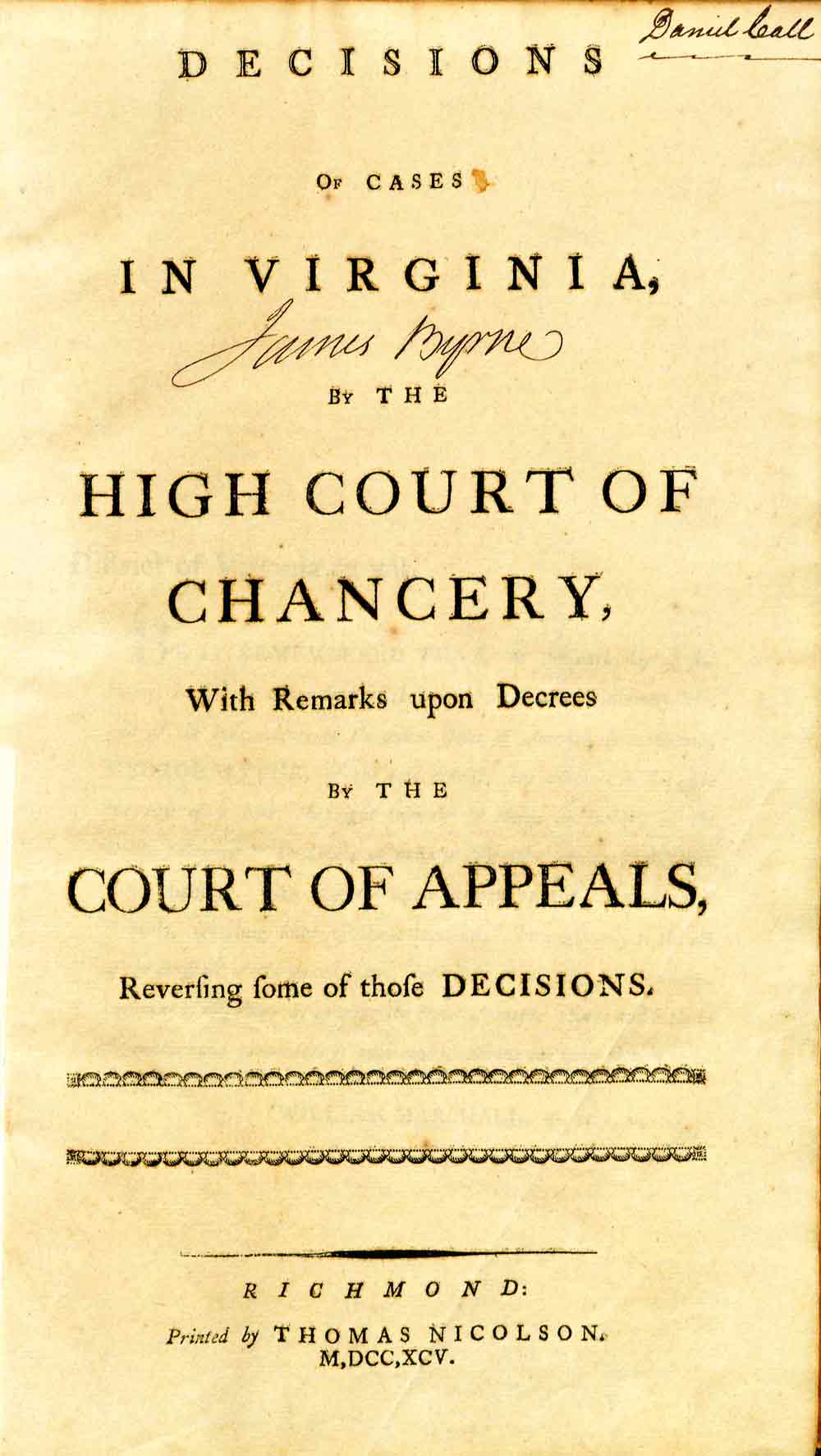Difference between revisions of "Daniel Call"
m |
m (→See also) |
||
| (One intermediate revision by the same user not shown) | |||
| Line 1: | Line 1: | ||
[[File:CallReports1801v1.jpg|thumb|right|250px|Title page for volume one of Call's ''[[Reports of Cases Argued and Adjudged in the Court of Appeals of Virginia]]'' (Richmond, VA: Printed by Thomas Nicolson, 1801).]] | [[File:CallReports1801v1.jpg|thumb|right|250px|Title page for volume one of Call's ''[[Reports of Cases Argued and Adjudged in the Court of Appeals of Virginia]]'' (Richmond, VA: Printed by Thomas Nicolson, 1801).]] | ||
| − | Daniel Call (1765 – 1840), an attorney and law reporter, was most likely born in Prince George County, Virginia to William Call, a county lieutenant during the American Revolution.<ref>E. Lee Shepard, "Call, Daniel" in ''Dictionary of Virginia Biography'', ed. Sara B. Bearss, John T. Kneebbone, J. Jefferson Looney, Brent Tarter, and Sandra Gioia Treadway (Richmond, Virginia: The Library of Virginia, 2001), 513.</ref>Although not much is known about his early life or education, Call [[Wythe the Teacher|studied law under George Wythe]] during the 1780s and began his practice in Petersburg.<ref>Ibid.</ref>In 1787, he married Elizabeth Taliaferro, George Wythe's niece. She died in 1793 shortly after the birth of their first child, Anne.<ref>Ibid.</ref> | + | Daniel Call (1765 – 1840), an attorney and law reporter, was most likely born in Prince George County, Virginia to William Call, a county lieutenant during the American Revolution.<ref>E. Lee Shepard, "Call, Daniel" in ''Dictionary of Virginia Biography'', ed. Sara B. Bearss, John T. Kneebbone, J. Jefferson Looney, Brent Tarter, and Sandra Gioia Treadway (Richmond, Virginia: The Library of Virginia, 2001), 513.</ref>Although not much is known about his early life or education, Call [[Wythe the Teacher|studied law under George Wythe]] during the 1780s and began his practice in Petersburg.<ref>Ibid.</ref>In 1787, he married Elizabeth Taliaferro, George Wythe's niece. She died in 1793, shortly after the birth of their first child, Anne.<ref>Ibid.</ref> |
Call moved to Richmond in 1791 to begin an appellate practice, primarily in real estate and equity.<ref>Ibid.</ref> He quickly gained the respect of his colleagues and clients as a "knowledgeable, skilled, and tenacious advocate" and joined the top ranks of the city's legal profession.<ref>Ibid., 514.</ref> In 1797, Call married Lucy Ambler, the sister-in-law of his friend and colleague, [[John Marshall]].<ref>Ibid., 513.</ref> Call shunned politics and chose to remain in Richmond, taking over the practices of John Marshall and [[Bushrod Washington]] when they were appointed to the United States Supreme Court.<ref> Ibid., 514.</ref> Ideologically, Call sided with the Federalists.<ref>Ibid.</ref> In the election of 1832, he supported Henry Clay and opposed Andrew Jackson.<ref>Ibid.</ref> | Call moved to Richmond in 1791 to begin an appellate practice, primarily in real estate and equity.<ref>Ibid.</ref> He quickly gained the respect of his colleagues and clients as a "knowledgeable, skilled, and tenacious advocate" and joined the top ranks of the city's legal profession.<ref>Ibid., 514.</ref> In 1797, Call married Lucy Ambler, the sister-in-law of his friend and colleague, [[John Marshall]].<ref>Ibid., 513.</ref> Call shunned politics and chose to remain in Richmond, taking over the practices of John Marshall and [[Bushrod Washington]] when they were appointed to the United States Supreme Court.<ref> Ibid., 514.</ref> Ideologically, Call sided with the Federalists.<ref>Ibid.</ref> In the election of 1832, he supported Henry Clay and opposed Andrew Jackson.<ref>Ibid.</ref> | ||
| Line 12: | Line 12: | ||
<div style="overflow: hidden;"> | <div style="overflow: hidden;"> | ||
*[[Biographical Sketch of the Judges]] | *[[Biographical Sketch of the Judges]] | ||
| + | *''[[Reports of Cases Argued and Adjudged in the Court of Appeals of Virginia]]'' | ||
*[[Wythe the Teacher]] | *[[Wythe the Teacher]] | ||
</div> | </div> | ||
Latest revision as of 08:27, 5 September 2018

Daniel Call (1765 – 1840), an attorney and law reporter, was most likely born in Prince George County, Virginia to William Call, a county lieutenant during the American Revolution.[1]Although not much is known about his early life or education, Call studied law under George Wythe during the 1780s and began his practice in Petersburg.[2]In 1787, he married Elizabeth Taliaferro, George Wythe's niece. She died in 1793, shortly after the birth of their first child, Anne.[3]
Call moved to Richmond in 1791 to begin an appellate practice, primarily in real estate and equity.[4] He quickly gained the respect of his colleagues and clients as a "knowledgeable, skilled, and tenacious advocate" and joined the top ranks of the city's legal profession.[5] In 1797, Call married Lucy Ambler, the sister-in-law of his friend and colleague, John Marshall.[6] Call shunned politics and chose to remain in Richmond, taking over the practices of John Marshall and Bushrod Washington when they were appointed to the United States Supreme Court.[7] Ideologically, Call sided with the Federalists.[8] In the election of 1832, he supported Henry Clay and opposed Andrew Jackson.[9]

Call is best known as a reporter of Virginia cases.[10] His six-volume work compiled reports of cases prior to 1820, as Virginia did not have an official reporter in this time period.[11] In creating the reports, Call relied upon a variety of documents and performed the difficult task of turning them into a workable precedent.[12] Call dedicated his first volume to George Wythe, his second to Edmund Pendleton, and the last to all of the judges of the Court of Appeals.[13] The fourth volume of the second edition contains Call's biography of Wythe.[14]
Call died on May 20, 1840 and was buried in Richmond next to his lifelong friend, John Marshall.[15] His works have been extensively reprinted, and they remain an authoritative source for Virginia law.[16]